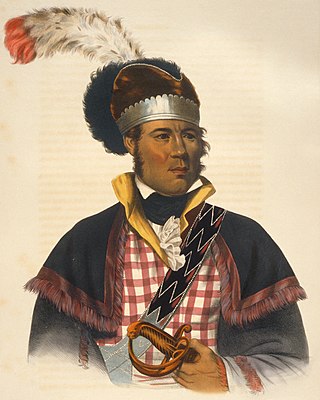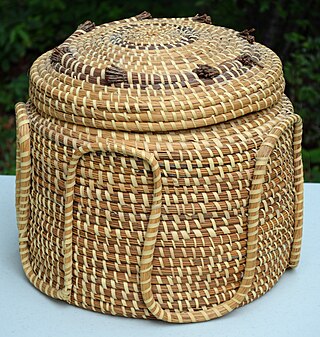Related Research Articles

McIntosh County is a county located in the U.S. state of Georgia. As of the 2020 census, the population was 10,975, a drop of 23.4 percent since the 2010 census. The county seat is Darien.

Darien is a city in and the county seat of McIntosh County, Georgia, United States. It lies on Georgia's coast at the mouth of the Altamaha River, approximately 50 miles south of Savannah, and is part of the Brunswick, Georgia metropolitan statistical area. It is the second-oldest planned city in Georgia and was originally called New Inverness. The population of Darien was 1,460 at the 2020 census, down from 1,975 in 2010.
Spirituals is a genre of Christian music that is associated with African Americans, which merged sub-Saharan African cultural heritage with the experiences of being held in bondage in slavery, at first during the transatlantic slave trade and for centuries afterwards, through the domestic slave trade. Spirituals encompass the "sing songs", work songs, and plantation songs that evolved into the blues and gospel songs in church. In the nineteenth century, the word "spirituals" referred to all these subcategories of folk songs. While they were often rooted in biblical stories, they also described the extreme hardships endured by African Americans who were enslaved from the 17th century until the 1860s, the emancipation altering mainly the nature of slavery for many. Many new derivative music genres such as the blues emerged from the spirituals songcraft.

Kenyon College is a private liberal arts college in Gambier, Ohio. It was founded in 1824 by Episcopal Bishop Philander Chase. It is the oldest private institution of higher education in the state of Ohio and enrolls approximately 1,800 undergraduate students. Students choose from over 50 majors, minors, and concentrations, including self-designed majors.

Hoodoo is a set of spiritual practices, traditions, and beliefs that were created by enslaved African Americans in the Southern United States from various traditional African spiritualities and elements of indigenous botanical knowledge. Practitioners of Hoodoo are called rootworkers, conjure doctors, conjure men or conjure women, and root doctors. Regional synonyms for Hoodoo include rootwork and conjure. As a syncretic spiritual system, it also incorporates beliefs from Islam brought over by enslaved West African Muslims, and Spiritualism. Scholars define Hoodoo as a folk religion. It is a syncretic religion between two or more cultural religions, in this case being African indigenous spirituality and Abrahamic religion.

Button Gwinnett was a British-born American Founding Father who, as a representative of Georgia to the Continental Congress, was one of the signers of the United States Declaration of Independence. Gwinnett was also, briefly, the provisional president of Georgia in 1777, and Gwinnett County was named for him. He was named in honor of his mother’s cousin, Barbara Button, who became his godmother. Gwinnett was killed in a duel by rival Lachlan McIntosh following a dispute after a failed invasion of East Florida.

African-American music is a broad term covering a diverse range of musical genres largely developed by African Americans and their culture. Its origins are in musical forms that developed as a result of the enslavement of African Americans prior to the American Civil War. It has been said that "every genre that is born from America has black roots."

Georgia's musical history is diverse and substantial; the state's musicians include Southern rap groups such as Outkast and Goodie Mob, as well as a wide variety of rock, pop, blues, and country artists such as the late Ray Charles, Otis Redding, James Brown, and The Allman Brothers Band. The music of Athens, Georgia is especially well known for a kind of quirky college rock that has included such well-known bands as R.E.M., The B-52's, and Pylon.

The Gullah are an African American ethnic group who predominantly live in the Lowcountry region of the U.S. states of South Carolina, North Carolina, Georgia, and Florida within the coastal plain and the Sea Islands. Their language and culture have preserved a significant influence of Africanisms as a result of their historical geographic isolation and the community's relation to their shared history and identity.

Sapelo Island is a state-protected barrier island located in McIntosh County, Georgia. The island is accessible only by boat; the primary ferry comes from the Sapelo Island Visitors Center in McIntosh County, Georgia, a seven-mile (11 km), twenty-minute trip. It is the site of Hog Hammock, the last known Gullah community. It is illegal to visit the island without a permit issued by state tourism authorities.
The National Heritage Fellowship is a lifetime honor presented to master folk and traditional artists by the National Endowment for the Arts. Similar to Japan's Living National Treasure award, the Fellowship is the United States government's highest honor in the folk and traditional arts. It is a one-time only award and fellows must be living citizens or permanent residents of the United States. Each year, fellowships are presented to between nine and fifteen artists or groups at a ceremony in Washington, D.C.

William McIntosh, also commonly known as Tustunnuggee Hutke, was one of the most prominent chiefs of the Creek Nation between the turn of the 19th-century and his execution in 1825. He was a chief of Coweta town and commander of a mounted police force. He became a large-scale planter, built and managed a successful inn, and operated a commercial ferry business.

Mary Elizabeth Jones was an American gospel and folk singer credited with helping to bring folk songs, games and stories to wider audiences in the 20th century. Alan Lomax, who first encountered Jones on a field recording trip in 1959, said, "She was on fire to teach America. In my heart, I call her the Mother Courage of American Black traditions."

The culture of Georgia is a subculture of the Southern United States that has come from blending heavy amounts of English and rural Scots-Irish culture with the culture of African Americans and Native Americans. Since the late 20th century areas of Northern, Central, and the Atlanta metropolitan area of Georgia have experienced much growth from people moving from the mid-west and northeastern parts of the U.S. and along with many immigrants from Latin America. Southern culture remains prominent in the rural Southern and the Appalachian areas of the state. Georgians share a history with the other Southern states that includes the institution of slavery, the American Civil War, Reconstruction, the Great Depression, segregation, and the civil rights movement.
A shout or ring shout is an ecstatic, transcendent religious ritual, first practiced by African slaves in the West Indies and the United States, in which worshipers move in a circle while shuffling and stomping their feet and clapping their hands. Despite the name, shouting aloud is not an essential part of the ritual.

Invisible churches among enslaved African Americans in the United States were informal Christian groups where enslaved people listened to preachers that they chose without their slaveholder's knowledge. The Invisible churches taught a different message from white-controlled churches and did not emphasize obedience to slave masters. Some slaves could not contact invisible churches and others did not agree with an invisible church's message but many slaves were comforted by the invisible churches.

Mary Jane Manigault was a sweetgrass basket maker from Mount Pleasant, South Carolina. She began sweetgrass basket-weaving at a young age, and the tradition has been continued by her children and grandchildren. The art of sweetgrass basket-weaving is an important tradition in the Gullah culture and has been a prominent practice in communities brought over to the United States as early slaves.

Hog Hammock is an African-American community on Sapelo Island, a barrier island of the U.S. state of Georgia.

Ring Shout, or, Hunting Ku Kluxes in the End Times is a dark historical southern gothic fantasy novella written by American fiction writer P. Djèlí Clark. A hardcover of the novella was published by Tor.com Publishing in October 2020. The story follows Maryse Boudreaux on her quest to hunt and destroy the demons summoned by the Ku Klux Klan known as "Ku Kluxes". She is joined by fellow hunters Sadie Watkins and Cordelia Lawrence, as a supernatural evil is rising in an alternate history of 1920s Macon, Georgia.

The Gullah are African Americans who live in the Lowcountry region of the U.S. states of Georgia, Florida, South Carolina, and North Carolina, in both the coastal plain and the Sea Islands. They developed a creole language, also called Gullah, and a culture with some African influence.
References
- ↑ Alexander, Andrew (1 March 2024). "Tiny community of Bolden, Ga., keeps ancient tradition of ring shout alive". Knox News. Retrieved 18 March 2024.
- ↑ "About Us". McIntosh County Shouters. Retrieved 18 March 2024.
- ↑ Rosenbaum, Art (1998). Shout Because You're Free: The African American Ring Shout Tradition in Coastal Georgia. University of Georgia Press. ISBN 9780820319346.
- ↑ Calemine, James. "The McIntosh County Shouters". Bitter Southerner. Retrieved 18 March 2024.
- ↑ Fox, Margalit (1 April 2013). "Lawrence McKiver, a Singer in Long Tradition, Dies at 97". The New York Times. Retrieved 18 March 2024.
- ↑ Emerson, Bo (2 Feb 2015). "McIntosh County Shouters bring slave songs to life". The Atlanta Journal-Constitution. Retrieved 18 March 2024.
- ↑ "McIntosh County Shouters". National Endowment for the Arts. Retrieved 18 March 2024.